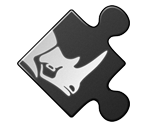Modify an Object's Name
Windows only
Demonstrates how to modify an object's user-defined name.
//This sample code demonstrates how to modify the name of a single object.
CRhinoCommand::result CCommandTest::RunCommand(const CRhinoCommandContext& context)
{
// Select an object to modify
CRhinoGetObject go;
go.SetCommandPrompt( L"Select object to change name" );
go.EnablePreSelect( TRUE );
go.EnableSubObjectSelect( FALSE );
go.GetObjects( 1, 1 );
if( go.CommandResult() != CRhinoCommand::success )
return go.CommandResult();
// Get the object reference
const CRhinoObjRef& objref = go.Object(0);
// Get the object
const CRhinoObject* obj = objref.Object();
if( !obj )
return CRhinoCommand::failure;
// Make copy of object attributes. This objects
// holds an object's user-defined name.
ON_3dmObjectAttributes obj_attribs = obj->Attributes();
// Prompt for new object name
CRhinoGetString gs;
gs.SetCommandPrompt( L"New object name" );
gs.SetDefaultString( obj_attribs.m_name );
gs.AcceptNothing( TRUE );
gs.GetString();
if( gs.CommandResult() != CRhinoCommand::success )
return gs.CommandResult();
// Get the string entered by the user
ON_wString obj_name = gs.String();
obj_name.TrimLeftAndRight();
// Is name the same?
if( obj_name.Compare(obj_attribs.m_name) == 0 )
return CRhinoCommand::nothing;
// Modify the attributes of the object
obj_attribs.m_name = obj_name;
context.m_doc.ModifyObjectAttributes( objref, obj_attribs );
return CRhinoCommand::success;
}
Alternatively:
//This sample code demonstrates how to modify the name of one or more objects.
CRhinoCommand::result CCommandTest::RunCommand( const CRhinoCommandContext& context )
{
// Select objects to modify
CRhinoGetObject go;
go.SetCommandPrompt( L"Select objects to change name" );
go.EnablePreSelect( TRUE );
go.EnableSubObjectSelect( FALSE );
go.GetObjects( 1, 0 );
if( go.CommandResult() != CRhinoCommand::success )
return go.CommandResult();
// Prompt for new object name
CRhinoGetString gs;
gs.SetCommandPrompt( L"New object name" );
gs.GetString();
if( gs.CommandResult() != CRhinoCommand::success )
return gs.CommandResult();
// Get the string entered by the user
ON_wString obj_name = gs.String();
obj_name.TrimLeftAndRight();
// Process each selected object
int i;
for( i = 0; i < go.ObjectCount(); i++ )
{
// Get the object reference
const CRhinoObjRef& objref = go.Object(i);
// Get the object
const CRhinoObject* obj = objref.Object();
if( !obj )
return CRhinoCommand::failure;
// Make copy of object attributes. This objects
// holds an object's user-defined name.
ON_3dmObjectAttributes obj_attribs = obj->Attributes();
// Is name the same?
if( obj_name.Compare(obj_attribs.m_name) == 0 )
continue;
// Modify the attributes of the object
obj_attribs.m_name = obj_name;
context.m_doc.ModifyObjectAttributes( objref, obj_attribs );
}
return CRhinoCommand::success;
}
…or:
//This sample code demonstrates how to modify all normal (not locked and not hidden) objects.
CRhinoCommand::result CCommandTest::RunCommand( const CRhinoCommandContext& context )
{
// Prompt for new object name
CRhinoGetString gs;
gs.SetCommandPrompt( L"New object name" );
gs.GetString();
if( gs.CommandResult() != CRhinoCommand::success )
return gs.CommandResult();
// Get the string entered by the user
ON_wString obj_name = gs.String();
obj_name.TrimLeftAndRight();
// Iterate through all normal (not locked and not hidden) objects
CRhinoObjectIterator it( CRhinoObjectIterator::normal_objects, CRhinoObjectIterator::active_objects );
CRhinoObject* obj = 0;
for( obj = it.First(); obj; obj = it.Next() )
{
// Make copy of object attributes. This objects
// holds an object's user-defined name.
ON_3dmObjectAttributes obj_attribs = obj->Attributes();
// Is name the same?
if( obj_name.Compare(obj_attribs.m_name) == 0 )
continue;
// Modify the attributes of the object
obj_attribs.m_name = obj_name;
context.m_doc.ModifyObjectAttributes( CRhinoObjRef(obj), obj_attribs );
}
return CRhinoCommand::success;
}

